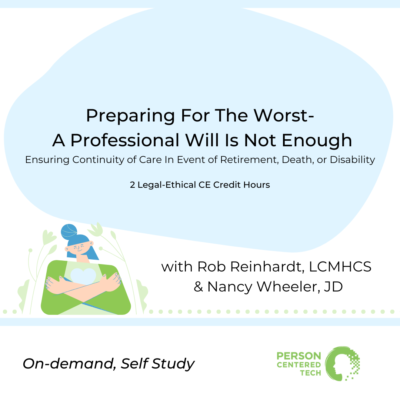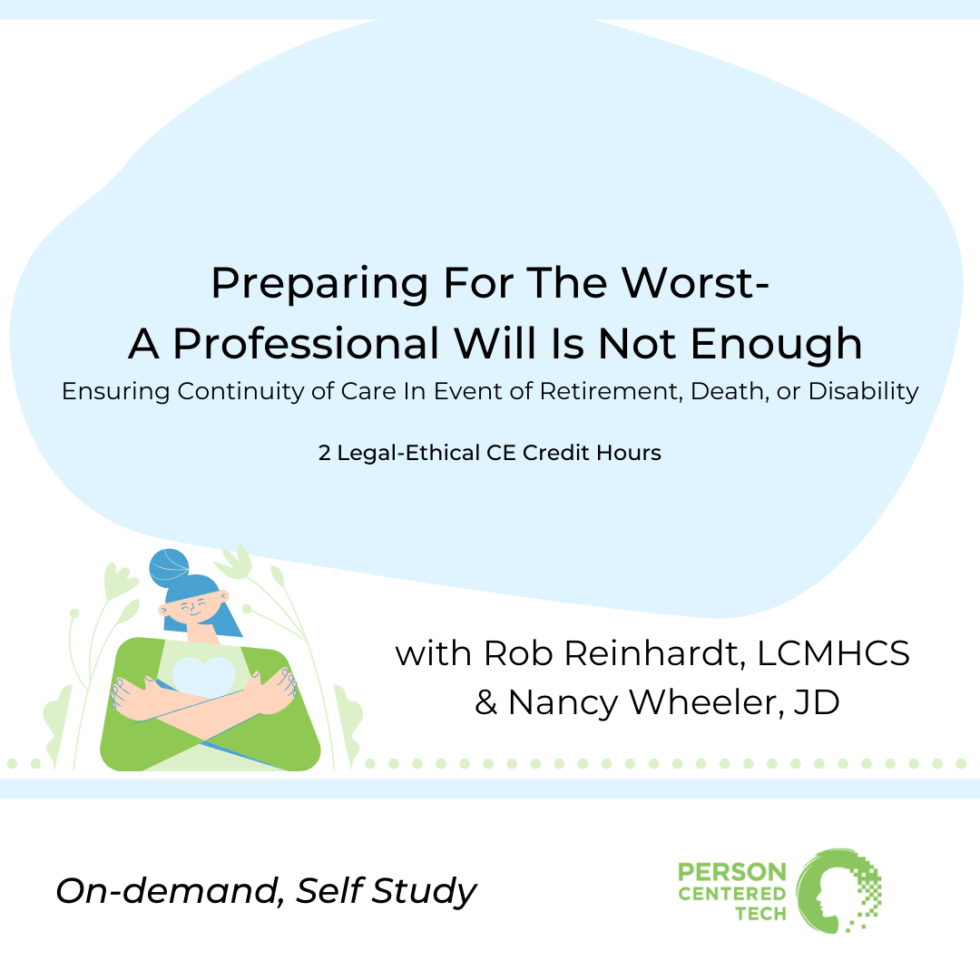Preparing For The Worst – a Professional Will Is Not Enough: Ensuring Continuity of Care In Event of Retirement, Death, or Disability
2 CE Credit Hours. Legal-Ethical. Continuing Education Session Replay
Presented By: Rob Reinhardt, LCMHCS & Nancy Wheeler, JD
This presentation will focus on the who, what, where, why, and how of creating a transition plan.
More than just a professional will, a transition plan considers any reason that might cause a counselor to be unable to continue seeing their clients. This could be due to death of a family member, extended illness, disability, moving out of state, retirement, or any number of other reasons. An effective transition plan must include all the information necessary for another qualified professional to ensure continuity of care for clients. This presentation will teach mental health clinicians how to construct such a plan, ensuring that their clients are cared for, no matter what circumstances arise. Also discussed will be the process of identifying an Emergency Response Team, those who will take over for the clinician should the need arise.
Course Description

Educational Objectives
- Participants will understand the reasons that our Codes of Ethics and HIPAA require that contingency plans be in place to ensure continuity of care for clients.
- Participants will understand why a Professional Will is not enough.
- Participants will have a general overview of the many types of information that need to be included in an emergency plan.
- Participants will learn the steps to creation of a plan, including identification of an Emergency Response Team, documentation of essential data, creation of contact letters/voice mail scripts, and more.
Syllabus
- Ethics of Continuity of Care
- Case Study
- Retirement, Death, Disability, The Unexpected
- Challenges Arising from Lack of Planning
- HIPAA/HITECH Considerations
- Potential Situations Requiring a Contingency Plan
- Creating a Plan
- Identifying Emergency Response Team (ERT)
- Records Custodian
- EHR/EMR/Technology
- Business Considerations / Professional Will
References
- American Health Lawyers Association, A Guide to Legal Issues in Life-Limiting Conditions (2005).
- ACA Code of Ethics (2014)
- Eldercare Locator, available at www.eldercare.gov. Retrieved February 11, 2016.
- Family Caregiver Alliance, accessible at www.caregiver.org. Retrieved February 11, 2016.
- National Family Caregivers Association, accessible at www.thefamilycaregiver.org. Retrieved February 11, 2016.
- Kiplinger’s Retirement Report (Washington, DC), ed. Knight A. Kiplinger
- Wheeler, A.M. and Bertram, B. (2015). The Counselor and the Law: A Guide to Legal and Ethical Practice (7th ed.). Alexandria, VA: American Counseling Association.
- Wheeler, A. M., & Reinhardt, R. (2014). Private Practice Preparedness: The Health Care Professional’s Guide to Closing a Private Practice Due to Retirement, Death or Disability. Retrieved from www.privatepracticepreparedness.com
Presented/Developed By
Rob Reinhardt, LCHMCS, M.Ed., NCC has his own successful counseling practice and is CEO of Tame Your Practice. Known for his expertise in reviewing and recommending EHRs for therapists, Rob previously worked in Information Technology for over ten years and has lived around technology his entire life. With a comprehensive mix of technology, clinical, and business experience he can provide consultation and coaching regarding all facets of private practice. Rob is also the creator of Describe, the popular deck of cards and activities that can be used with individuals, families and groups of all ages. He’s also co-host of the popular podcast, TherapyTech with Rob and Roy, column editor for Counseling Today, the professional magazine published by the American Counseling Association, and co-author of the book Private Practice Preparedness: The Heath Care Professional’s Guide to Closing a Practice Due to Retirement, Death, or Disability.
Rob is also a fan of board gaming, ultimate frisbee, travel, and quality time with his family.
Consulting Web Site: www.tameyourpractice.com
Describe Web Site: www.describecards.com
Private Practice Preparedness Web Site: www.privatepracticepreparedness.com
Podcast Web Site: www.therapytechrobroy.com
Professional Web Site: www.robreinhardtlpc.com
Private Practice Web Site: www.serenityspringswellness.com
Anne Marie “Nancy” Wheeler, JD, is an attorney who started her practice of law in the District of Columbia in 1981; she later became licensed in Maryland. In 2018, Nancy began a phased-in process of retirement, but she continues to write and speak about mental health ethics and risk management. For over 30 years, she managed risk management services for the American Counseling Association and the American Psychiatric Association. Through this and private client work with practicing counselors, psychiatrists, and other mental health practitioners, Nancy assisted providers in analyzing and understanding challenging legal, ethical and regulatory issues ranging from privacy to managed care.
Nancy also served for 17 years as an affiliate faculty member of the Graduate Pastoral Counseling Program of Loyola University Maryland, where she taught ethics and legal issues courses to masters and doctoral-level students. She was also an adjunct faculty member of the Graduate Department of Counselor Education at Stetson University in Florida. Additionally, she has presented hundreds of seminars, workshops and keynote addresses on medical and mental health legal and ethical issues. She has also produced newsletters, webinars and podcasts on legal compliance and risk management strategies. Nancy has authored or contributed to numerous publications, including the following: Wheeler, A.M. & Bertram, B. (2019). The counselor and the law: a guide to legal and ethical practice (Alexandria, VA: American Counseling Association); Reinhardt, R. & Wheeler, A.M. (2014). Private practice preparedness: the health care professional’s guide to closing a practice due to retirement, death or disability. Publisher: Author; and Wheeler, A.M. (2005). Top ten legal and risk management areas of concern for psychiatrists. In J. Lazarus (Ed.), Entering private practice: a handbook for psychiatrists Arlington, VA: American Psychiatric Publishing Inc. For many years, Nancy has written a monthly column on risk management issues for the American Counseling Association, which she continues today.
Program Notices
Accuracy, Utility, and Risks Statement: This program discusses legal matters associated with operation and closing of a practice.It may not include information on all applicable state laws. Misapplication of the materials, or errors in the materials, could result in non-compliance with applicable laws or ethics codes.
Conflicts of Interest: Reinhardt and Wheeler are co-authors of the book Private Practice Preparedness which provides instructions and templates for creating a preparedness plan and will be mentioned during the presentation.
Commercial Support: Person Centered Tech Inc. is sponsoring this event and will give a brief commercial presentation during the break.
This course is subject to our cancellation/refund policy and complaint policy.


